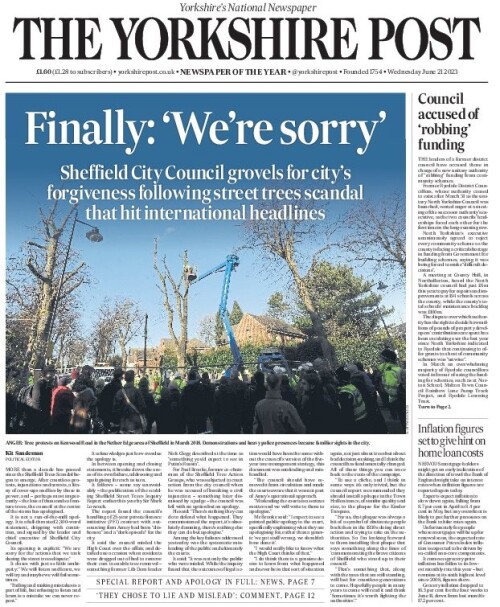An editor who long campaigned against a controversial mass tree-felling scheme says he will “treasure” an apology from the council responsible.
James Mitchinson has welcomed an open apology from Sheffield City Council for misleading the public, the media and the courts over a programme to fell 17,500 street trees, despite many of them being healthy.
James campaigned against the operation while editor of the Sheffield Star and subsequently after taking the reins at the Yorkshire Post.
In 2017, the Leeds-based Post’s campaign prompted then-Environement Secretary Michael Gove to order a halt to the council’s plans, citing the newspaper’s “persistent and persuasive” campaigning on the issue as influencing his decision.

Post journalist Chris Burn later became locked in a Freedom of Information battle to reveal details of the authority’s “secretive” tree-felling policy, winning the right to publish them after threatening to take the case to the Information Commissioner.
The Post splashed on the council’s apology yesterday, pictured above.
Posting an image of the front page on Twitter, James wrote: “Honestly, this front page I will treasure.
“For years and years the Yorkshire Post was characterised as wrong-headed; I was accused of having a spiteful agenda; people in power used local radio to abuse my team and our reputation – yet we, and local residents, were right all along.
“Seeing him operate at close quarters over the years has been a privilege, but I can tell you that Chris Burn deserves the freedom of Sheffield for his work on this story – a city he cares about deeply.
“Ferocious tenacity in the face of relentless obfuscation.”
In its apology, the council said: “We are sorry for developing and adopting a flawed plan and including the aim to replace half of the city’s street trees.
“We would like in particular to apologise for repeatedly saying in the media, and in correspondence, that there was no target for the tree replacement programme, that felling was always a last resort and that any change to the tree replacement programme would result in catastrophic costs.
“It is clear that this was not the case.”





 Follow HTFP on Twitter
Follow HTFP on Twitter